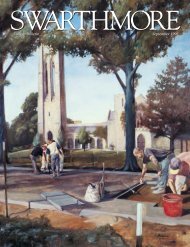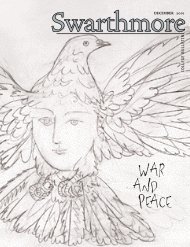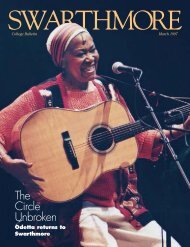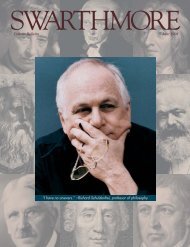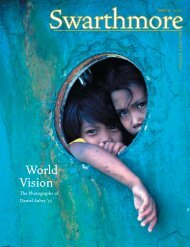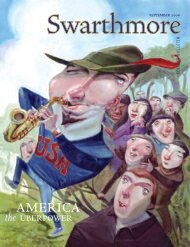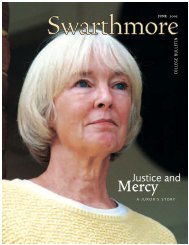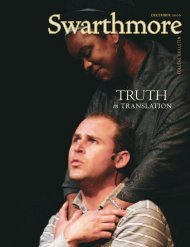profileCompassion in BusinessGABRIEL FAIRMAN ’02 BELIEVES THAT CORPORATE SUCCESS DEPENDS ON MORE THAN JUST A PRODUCT.Despite his facility with languages, Fairman describes himselfprimarily as an agent for social transformation. For moreinformation on his company, visit www.bureautranslations.com.aving been born in São Paulo, Brazil, Gabriel Fairman grew upHspeaking Portuguese. He also learned Spanish early on from hisArgentine father and picked up English attending Americanschools, where he was also taught French. At Swarthmore, helearned Italian during a semester abroad in Italy. And, in his senioryear, he began studying Mandarin Chinese, which he polished duringa 5-month stay in a Zen Buddhist monastery in Taiwan.So it’s not surprising that Fairman—now back in São Paulo—makes his living working with words, as executive director ofBureau Translations, where translators interpret in 20 languages.Beside his love of languages, Fairman has a penchant for philosophyand psychology—thanks to his College courses, he says, especiallythose taught by Frank and Gil Mustin Professor of PsychologyEmeritus Kenneth Gergen. Fairman graduated with a special majortitled The Death and Rebirth of Human Agency.“This is just a fancy name for the study of how people areimpaired in their decision-making by influences subconsciouslyengrained as a result of their culture,” he says. The rebirth of theseprocesses occurs when we become actively aware of this culturalconditioning of our modes of thinking and allow ourselves to beopen to alternative explanations for human behaviors, rather thanpassively seeing only one “right” explanation. “I could never reallyaccept any one way of thinking as the ultimate way,” Fairman says.MURILO RODRIGUESFairman’s route to his current job was not a direct one. Aftermonths of monastic routine “working as a gardener, meditating,teaching English to children at an orphanage inside the monastery,and practicing kung fu,” he worked at a New York consulting firmfor a while, followed by a year with his father in international tradeand 6 months in the export department of Brazil’s largest mineralexploration company.Back in São Paulo, Fairman was struck by the clash between theharshness of the business world in “this do-or-die, cut-throat city”and the insights he had gained in his pursuit of philosophy andpersonal inner exploration. “I was disillusioned by business practicesthat put the importance of human relationships in the background,so I took over the home business my mother founded 25years ago and turned it into a start-up company that had at its corean emphasis on relationships,” he says.In light of Fairman’s drive to reach beyond the limitations of culturallyimposed perceptions, his choice of profession—in which hemust strive on a daily basis to reconcile the cultural differences thatreveal themselves through language—seems entirely appropriate.His staff—experts at building connections through language—are expected to be equally adept in forming relationships based ontraits like tolerance of differences, understanding, and compassion.For example, Fairman describes being commissioned to translatea set of highly sensitive documents pertaining to a multimilliondollarcontract between a Brazilian company and Chinese company.“We had to understand the thought process of the Brazilian supplierand figure out how the wording in the original Chinese version ofthe contract would fit within this context. Brazilian texts are typicallynot concise and are often filled with flowery language. So, withthe help of consultants, we examined the language of the originalChinese document before translation. Then, after translation, weconsulted with lawyers in both countries and did more rewording orrephrasing before producing the final contract,” he says.Fairman’ s carefully chosen staff comprises 10 in-house consultantsand 15 translators. All spend a fair amount of time in the officeattending training sessions, seminars, or presentations. “I am lookingfor people who have the basic set of characteristics needed forworking in a company, such as punctuality, diligence, and thoroughness,”he says, “but above all, they should be able to understand andaccept differences and be willing to learn from these differences, notjust sit back and accept the status quo.”At weekly meetings, employees share ideas on topics such asproject management, health issues, and company-client relationships.“We have a continuous learning system,” Fairman says. “I’mtrying to balance my theoretical background with the pressingdemands for productivity to build a business based on harmoniousand evolving relationships rather than just a product.”—Carol Brévart-Demmmarch 2007: 77
Q + A“Preposterously Delightful”By Carol Brévart-DemmProfessor of German Hansjakob Werlenloves language—his own and others. Bornin a tiny Swiss valley, he grew up speaking alocal Alemanic dialect, the language inwhich he still feels most comfortable, eventhough his German is impeccable. So is hisEnglish. After attending Spanish classestaught by colleagues and spending time inLatin America, he also enjoys conversing inand reading Spanish. He gets by in French,too. He finds beauty in the sounds of words.As a graduate student at Stanford, his interestin semiotics led him to attend a seminartaught entirely in Russian by an Estoniansemiotician, whose reading of Pushkin heldWerlen spellbound for a semester, althoughhe knew no Russian. He occasionally visits aVietnamese restaurant in Philadelphia,where, over a bowl of steaming phô, he listensto the sounds of the conversation.For 20 years, Werlen has been teaching18th- and 19th-century German literature toSwarthmore students, many of whom stayin touch. Recently, he’s been teaching contemporaryGerman literature and food studies.He is a member of the InternationalHerder Society and the American GoetheSociety.Passionately interested in food, Werlenfounded the Philadelphia chapter of SlowFood in 1998. The international eco-gastronomicmovement, with 80,000 membersworldwide, is dedicated to ecologicallysound food production, the invigoration ofregional culinary traditions, and the pleasuresof the table. He spent a week livingwith a Ketchua family in Ecuador, helpingthe local cooperative of 400 families expandits small cocoa-bean business into the internationalgourmet chocolate and cocoa market.A beer connoisseur, he has friendsamong Philadelphia’s microbrewers.Werlen enjoys using the occasional oxymoron.He’s something of an oxymoronhimself—intensely intellectual, wildly jocular.He describes his time at Swarthmore as“preposterously delightful.” The same canbe said of time spent in his company.What’s cool about the German language?Many German words have a kind of literaldescriptiveness that can be fun when youteach the language, such as Fingerhut (thimble,literally, “finger hat”) or Stinktier(skunk, literally “smelly animal”).Which courses do you enjoy teaching most?My recurring favorite is the Goethe Seminar.He was such a revolutionary writer. Allthose trite, romantic settings of currentsoap operas could be vernacular variationson The Sorrows of Young Werther. Anothergood one was the freshman seminarBetween Appetite and Aesthetics. This was away to sneak in my preoccupation with foodand the history of aesthetics. Rick Eldridge(philosophy) came and explained how thesensual part of taste was banned by Germanphilosopher Immanuel Kant, and Mark Wallace(religion) talked about religious foodtaboos. It was great fun.Is there a work of German literature that everyoneshould read?Read Goethe’s Faust, Part I. It’s funny, beautiful,tragic, and relates to issues beingdebated now—the role of science, utilizationof the earth, things like that.If you could be a German literary figure, whowould you choose?I’d like to have been someone like E.T.A.Hoffmann. He was a jurist by training, composer,conductor, music critic, draftsman,caricaturist, and a great writer. He feltdeeply about art and wrote beautifully andhumorously, yet he also had a dark side. Hewas just a convivial, fun, irreverent guy.Everyone should read Tales of Hoffmann orlisten to the opera.Are you planning any new research projects?I’m collaborating on a volume about the historyof methodologies in my field. I’m interestedin the “half-life” (as I call it) of theory,and I’m looking at a particular set of theoreticalpractices that were important forGermanistik in the 20th century.Do you have a teaching style?I have no fixed script. I love to digress. Afterall, you’re learning about life, so I’m as apt todeliver a plaidoyer for good stout as I am totalk about the Enlightenment.Do you have a favorite beer?Basically, the last good beer I drank. Wehave about 10 world-class small brewers inand around Philadelphia. I know them allbecause they come to Slow Food events Iorganize. Living in the United States rightnow is like living in beer heaven. When I’min Germany, I declare apodictically that,after Belgium, the United States is the bestbeer country in the world. The Germansdon’t take this lying down, of course.What was your most recent Slow Food event?I invited Herb Eckhouse, an Iowa prosciuttomaker and father of Laurel Eckhouse ’03, totalk with us and let us taste his incrediblecured meats. He brought speck, culatello,prosciutto, and pancetta. All his productsmeasure favorably with the best Italian andSpanish cured meats. It’s just like the Americanbeer. Or Metropolitan bread. You cansearch far and wide in France before findingthe quality of sourdough bread-making thatyou find at Philly’s Metropolitan Bakery.Which three words describe you best?Curious, energetic, and change-loving.How do you think your wife would describe you?Generous, funny, and gregarious.What do you consider the height of success?It’s a bit like what Barry Schwartz says aboutthe paradox of choice—when you don’tmanically compare yourself and your lotwith that of others, when you’re happy withyour own situation in life. I’ve reached it.I’ve been here for 20 years. I enjoyed it fromthe very beginning, and I enjoy it more now.According to Hansjakob Werlen, thegrowth of North American microbreweries—suchas Yards Brewing Co. inNorth Philadelphia (right)—has heraldeda Golden Age of Beer in this country.80 : swarthmore college bulletin



